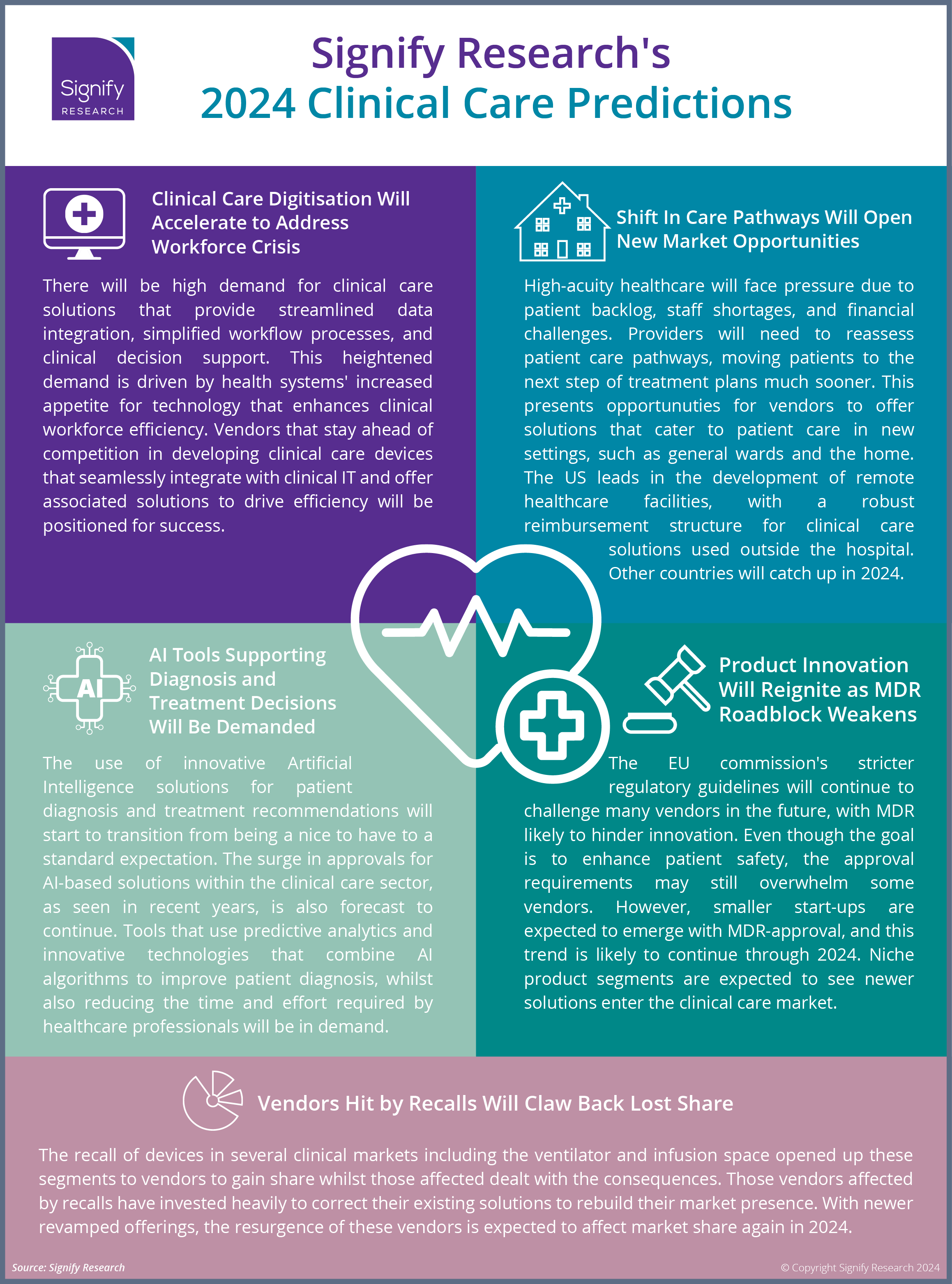
Written by

Cranfield, UK, 16th January 2024 – The Clinical Care market has seen a plethora of market trends in recent years with the COVID-19 pandemic having the pinnacle effect on growth dynamics and opportunities in most markets. Component and supply issues subsided, and product demand started to rebalance in 2023, as the market adjusted to the newer way in which healthcare is provided. As we head into 2024, many Clinical Care vendors will be seeking opportunities to maximise on the healthcare reset in many regions. This insight discusses the top five trends Signify Research predicts for the Clinical Care market in 2024.

1: Clinical care digitisation will accelerate to address workforce crisis
Resource issues continue to plague the healthcare market; despite the dwindling number of physicians and nurses, healthcare facilities continue to feel the pressure of increasing patient demand. Healthcare providers are rethinking the way in which they prioritise patient care, utilising lower-acuity departments to treat less critical acute patients. Meanwhile, high-acuity wards are levelling up in their technology to ensure more severe patient cases have advanced solutions and leading physician resource to treat the growing number of complex patients.
Vendors have used this as an impetus to revamp their portfolios with newer easier to use digital solutions that streamline clinical workflow and data integration. Intuitive devices that can aid the user to optimise the care provided and improve patient outcomes through features that aid clinical decision support, will be high on the wish list of many hospitals in 2024. New solutions with improved interoperability capabilities to enable the smooth transition of patients between care settings will also see increased demand.
2: Shift in care pathways will open new market opportunities
Whilst healthcare facilities remain overstretched, the development of new patient care pathways is spearheading opportunities in new care settings. The appetite to reduce the time a patient remains in hospital is growing from both a clinician and patient perspective. Not only is the burden on the hospital relieved, but it is also believed that patient recovery times improve when they are treated in a home-setting. Following the pandemic, many patients have become more reluctant to enter a clinical environment and are starting to show greater preference to enter an outpatient setting or remain at home for treatment if possible. The appeal of solutions that can prevent hospital admissions through the provision of acute patient management in a home setting will continue to grow in 2024.
The provision of remote patient management is much more advanced in the US. However, with improving infrastructure and the development of reimbursement policies, the interest in the mature countries of the Western European and Asia Pacific regions is opening up new opportunities. Signify Research expects the proportion of clinical devices utilised in a homecare setting to increase in 2024 in response to evolving care pathways and supporting clinical policies.
3: AI tools supporting diagnosis and treatment decisions will be demanded
The use of artificial intelligence in the Clinical Care segments has been relatively limited when compared to the likes of the medical imaging market. That said, there has been significant development in recent years with a flurry of announcements in many clinical segments, including cardiac care. To date, over 700 AI/ML-enabled devices have been approved under the FDA’s 510(k) pathway, including nearly 40 AI-enabled ECG devices, with several AI-ECG vendors also having pending FDA 510(k) approval. The majority of the approvals for AI-based algorithms in ECG have been for the detection of the most common arrythmias, including Atrial fibrillation (Afib), Atrial Flutter, Bradycardia, Ventricular fibrillation (Vfib), and Supraventricular tachycardia (SVT).
Looking to the ICU, there has been increasing demand for data analytics that support the increasing prevalence of data from a growing number of devices. Early-warning scoring, sepsis detection and predictive analytics have been the key areas of focus, to date. This is helping physicians with more informed decision making, improving patient safety and outcomes, and improving cost-efficiency.
Generative AI remains a very nascent technology and considerable barriers in terms of regulation, privacy and usability still need to be overcome. Particularly in relation to clinical support.
As healthcare professionals face increasingly pressured situations, they are becoming more open to utilising solutions that can aid in their clinical workflow. Tools that use predictive analytics and innovative technologies that combine AI algorithms to improve patient diagnosis, whilst also reducing the time and effort required by healthcare professionals will be in demand.
4: Product innovation will reignite as MDR roadblock weakens
The introduction of the EU MDR in 2021 was followed with confusion and uncertainty over the process that was in place to gain regulatory approval submission. There was mixed response to the extension in the submission deadline, with many manufacturers expecting the process to slow product innovation. Some vendors were also discouraged after investing significant resource to meet earlier proposed deadlines. However, initial frustrations with the MDR process have now started to wain from most vendors.
New approvals are now starting to come thick and fast, with many newer vendors announcing that they have gained approval for their products. This trend is expected to gain momentum through 2024 with newer solutions entering the Clinical Care market, most notably in niche product segments.
5: Vendors hit by recalls will claw back lost share
There have been a number of high-case recalls issued within the Clinical Care market in recent years, with most activity in the ventilator and infusion markets. Companies such as Philips, BD, ICU Medical and Baxter have battled to remedy the issues faced with their solutions and have been very forward in communicating the actions that they have taken. The focus on patient safety is expected to be at the forefront of both manufacturers and governing bodies, and regulatory approval processes will continue to be refined and more informed.
Several of the vendors that were most impacted by recalls have focused their efforts to improve their solutions and have released newer solutions with the promise that they are safe and effective. Signify Research projects that with the resurgence of these vendors is expected to affect market share again in 2024.
About Kelly Patrick
Kelly joined Signify Research in 2020 as a Principal Analyst. She has over 15 years’ experience covering a range of healthcare technology research at IHS Markit/Omdia. Kelly’s core focus has been on the Clinical Care sector, including patient monitoring, diagnostic cardiology, respiratory care, and infusion and associated IT solutions. Kelly holds a BSc degree with honours in Pharmacology from the University of Leeds. In her spare time, Kelly has a passion for running and outings with her husband and three children.
About the Clinical Care Team
The Clinical Care team provides market intelligence and detailed insights on the Clinical Care equipment and IT markets. Our areas of coverage include patient monitoring, diagnostic cardiology, infusion pumps, ventilators, anaesthesia devices, and high-acuity IT. Our reports provide a data-centric and global outlook of each market with granular country-level insights. Our research process blends primary data collected from in-depth interviews with healthcare professionals and technology vendors, to provide a balanced and objective view of the market.
About Signify Research
Signify Research provides healthtech market intelligence powered by data that you can trust. We blend insights collected from in-depth interviews with technology vendors and healthcare professionals with sales data reported to us by leading vendors to provide a complete and balanced view of the market trends. Our coverage areas are Medical Imaging, Clinical Care, Digital Health, Diagnostic and Lifesciences and Healthcare IT.
Clients worldwide rely on direct access to our expert Analysts for their opinions on the latest market trends and developments. Our market analysis reports and subscriptions provide data-driven insights which business leaders use to guide strategic decisions. We also offer custom research services for clients who need information that can’t be obtained from our off-the-shelf research products or who require market intelligence tailored to their specific needs.
More Information
To find out more:
E: enquiries@signifyresearch.net
T: +44 (0) 1234 986111
www.signifyresearch.net
